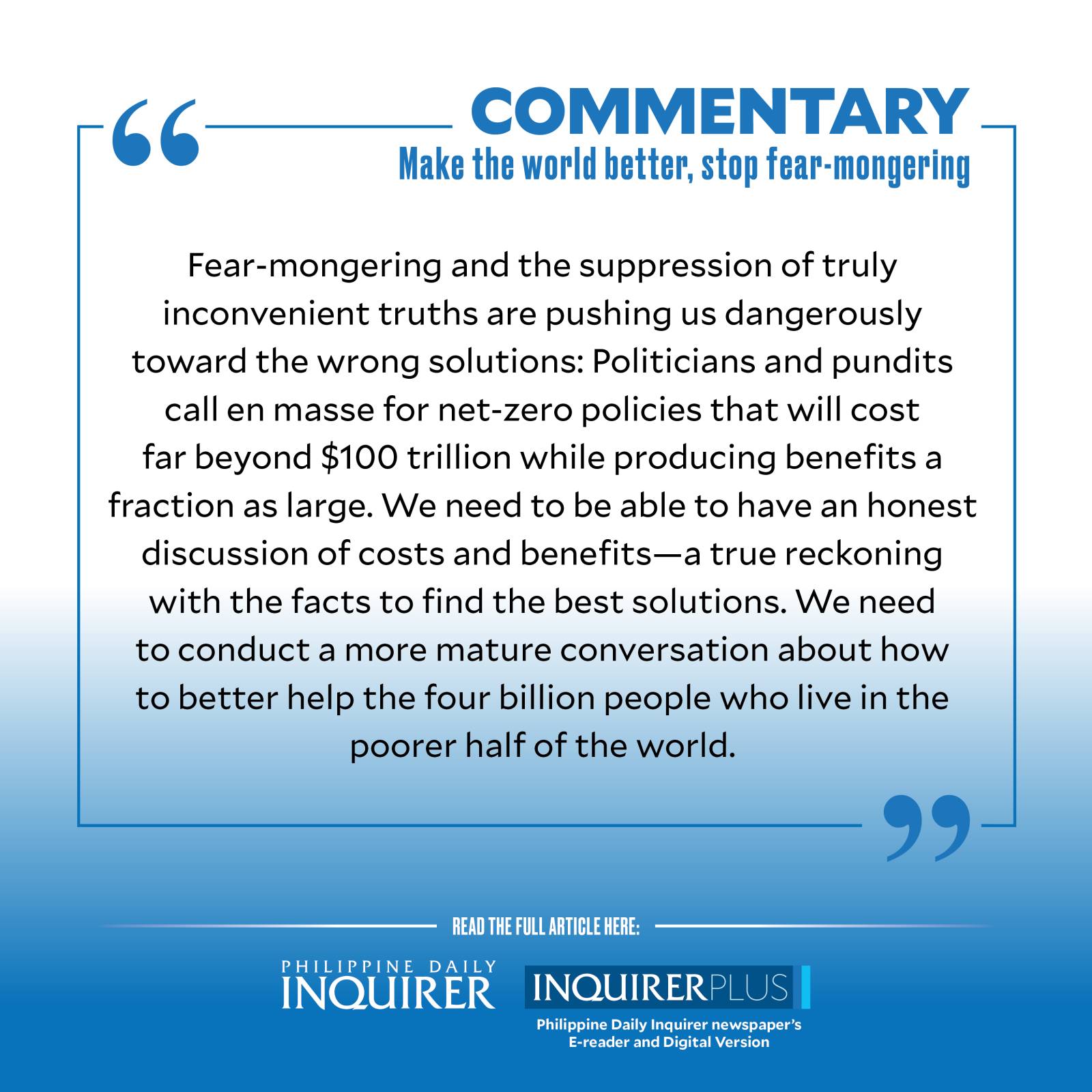Make the world better, stop fear-mongering

The meaningful exchange of truly diverse ideas and perspectives has withered over recent decades. Unorthodox thinking is increasingly trashed or disregarded, even as the chattering class’ fear- and force-predicated approaches repeatedly prove inadequate to cope with the true complexities and crises of the modern world.We need instead to foster and promote critical thinking and constructive discussion. We are making every effort to ensure that our new Alliance for Responsible Citizenship (ARC), an international coalition of politicians, business leaders, public intellectuals, and cultural commentators, will help ensure that a broader range of perspectives can be heard globally.
Consider the world’s response to the COVID pandemic. A panic-stricken lockdown orthodoxy far too soon took hold, and those whose policy proposals deviated quickly were labeled “COVID deniers.” Governments that went the farthest were feted by public intellectuals and in newspaper opinion pages.
The obvious downsides to universal lockdowns were ignored, thus, we saw increases of inequality in income distribution and wealth, widespread loss of employment, substantive declines in spending, and general deterioration in economic conditions; serious declines in mental health and well-being, delayed and diminished access to health care, and record high levels of domestic violence. The education of children was particularly affected: School closures on average robbed children of more than seven months of education. The huge impact on kids’ knowledge could end up costing $17 trillion in lifetime earnings according to research by the World Bank, United Nations Educational, Scientific, and Cultural Organization, and UN Children’s Fund. Poor children, girls, and children with disabilities suffered the largest losses.
We need to have a serious conversation about our manner of response before the next crisis—pandemic or otherwise—to ensure that the cure is not much worse than the disease. Consider the alarmist treatment of climate change. Campaigners and news organizations play up fear, in the form of floods, storms, and droughts, while neglecting to mention that reductions in poverty and increases in resiliency mean that climate-related disasters kill ever fewer people: Over the past century, deaths have dropped 97 percent. Heatwaves capture the headlines. Globally, however, cold kills nine times more people. The higher temperatures arguably characterizing this century have resulted in 166,000 fewer temperature-related deaths overall.
Fear-mongering and the suppression of truly inconvenient truths are pushing us dangerously toward the wrong solutions: Politicians and pundits call en masse for net-zero policies that will cost far beyond $100 trillion while producing benefits a fraction as large. We need to be able to have an honest discussion of costs and benefits—a true reckoning with the facts to find the best solutions.
We need to conduct a more mature conversation about how to better help the four billion people who live in the poorer half of the world. The UN promises everything imaginable through its Sustainable Development Goals: the end to extreme poverty, hunger, and disease; reduction of inequality and corruption; cessation of war; amelioration of climate change; universalization of education—even ease of access to urban parks. But a plan that makes all problems the same compelling crisis without prioritization is no plan at all, merely a recipe for the appearance of action and virtue. This year, 2023, sits at the midpoint between the start of the goals in 2016, and their hypothetical attainment in 2030. We are now at halftime, but nowhere near close to halfway there. Even the UN secretary general admits that the goals are “far off track.”
We must zero-in on the most efficient solutions first. There are a dozen areas where much could be done for comparatively little money. We could efficiently and quickly boost learning in schools—vital after COVID lockdowns—save mothers’ and newborns’ lives, tackle malaria, make government procurement much more efficient, improve nutrition, increase land tenure security, turbo-charge the effects of trade, advance skilled migration, and increase child immunization rates. These sensible and implementable policies could save more than four million lives per year, and generate economic benefits worth over a trillion dollars for an outlay of $35 billion a year for the next seven years.
Enough panicked fear-mongering. We can focus on what is truly important and attainable, initiate and reward a more nuanced global discussion regarding the problems that will always beset us, and look forward confidently to a world more abundant, more laden with opportunity, more sustainable, and more hopeful.
—————-
Dr. Bjorn Lomborg is president of the Copenhagen Consensus and visiting fellow at Stanford University’s Hoover Institution. His latest book is “Best Things First.” Dr. Jordan B. Peterson is professor emeritus at the University of Toronto, and the author of “Maps of Meaning,” “12 Rules for Life,” and “Beyond Order.”




















